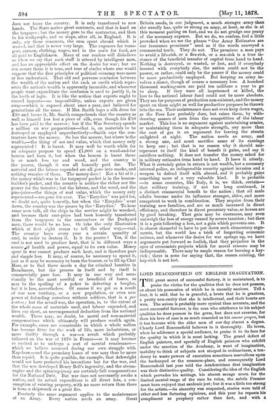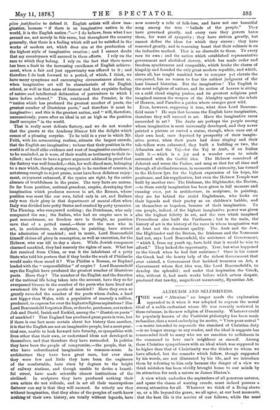LORD BEACONSFIELD ON ENGLISH IMAGINATION. T HE great secret of successful
flattery, it is maintained, is to praise the victim for the qualities that he does not possess, or about his possession of which he is uneasily anxious. Tell a lout, it is said, that he is graceful, a brute that be is gracious, a pretty non-entity that she is intellectual, and their hearts are won. The axiom is probably more cynical than accurate, and the most successful flatterer, is the man who attributes to his subject qualities he does possess in the germ, but does not exercise, for then his love of ease is as much consoled as his amour propre, but it has become with the elder men of our day almost a dogma. Clearly Lord Beaconsfield believes in it thoroughly. He loves, when he addresses a special audience, to praise it to its face for the quality in which it is most lacking. The grand defect of English painters, and specially of English painters who exhibit under the sanction of the Academy, is want of imagination, inability to think of subjects not steeped in ordinariness, a ten- dency to waste powers of execution sometimes marvellous upon the hackneyed or the common-place, and consequently Lord Beaconsfield last year told the Academicians that imagination was their distinctive quality. Considering the idea of the English which pervades his writings, his almost savage scorn, for the limited mental range of the race he rules, the subtle Premier must have enjoyed that sardonic jest; but it was a little too strong for the artists,—ita sincerity was suspected, stories were told of other and less flattering opinions, and this year he repeats his compliment as prophecy rather than fact, and with a piece justificative to defend it. English artists will show ima- gination, because "if there is an imaginative nation in the world, it is the English nation :"—" I do believe, from what I see around me, not merely in this room, but throughout the country generally, that there is a feeling which will not be satisfied in the works of modern art, which does aim at the production of the highest style of imaginative creation ; and I cannot doubt that my countrymen will succeed in these efforts. I rely on the race to which they belong. I rely on the fact that there never has been a limit to the increasing excellence of English achieve- ment, when a fair and just opportunity was offered to it ; and therefore I do look forward to a period, of which, I think, we have many symptoms and encouraging circumstances about us, when ' imaginative art will be characteristic of the English school, as well as that sense of humour and that exquisite feeling of nature and intellectual delineation of portraiture to which I have before referred." This, continued the Premier, is the "nation which has produced the greatest number of poets, the greatest number of illustrious poets," and therefore it must be imaginative ; and this is the greatest nation, and "will, therefore, unconsciously, yearn after an ideal in art as high as the position itself occupies" in the world.
That is really most delicate flattery, and we do not wonder that the guests at the Academy Dinner felt the delight which comes of a pleasing surprise. To be told in a year in which Mr. Frith, with his sermonising realism, attracts the largest crowds, that the English are imaginative ; to hear that their position in the world is of itself alike evidence and root of imaginative excellence ; to be reminded, as it were, of their wealth as testimony to their in- tellect; and then to have a grave argument adduced in proof that the flattery was well founded,—this, for well-dined men, belonging to a race which, though strong enough to be careless of censure, is notstrong enough to reject praise, must have been delicious enjoy- ment, enjoyment enhanced, if the cynics are right, by the entire absence of truthfulness in the praise. The very facts are untrue. So far from position, national grandeur, empire, developing that imagination which produces success in art, the Roman, whose position was moat like our own, failed only in art, and Italians only won their glory in that department of mental effort when Italy was divided into petty States and crushed by petty tyrannies. The Fleming, who conquered nothing ; the Dutchman, who only conquered the sea ; the Italian, who had no empire save in a past remembrance, no freedom save in thought, no position save that of a petted vassal,—these are the men who in art, in architecture, in sculpture, in painting, have stirred the admiration of mankind ; and in music, Lord Beaconsfield himself claims all glory in conception, as well as execution, for the Hebrew, who was till to-day a slave. While Jewish composers charmed mankind, they had scarcely the rights of men. What has Art received from China, or was it the inhabitant of a petty State who told his porters that if they broke the work of Phidias he would make them mend it ? Was Phidias a Roman, or Raphael loaded with the " responsibilities " of empire ? Lord Beaconsfield says the English have produced the greatest number of illustrious poets. Have they ? The number of the English and the duration of the national life being taken into the account, have they so far overpassed Greece in the number of the poets who have lived and sweetened life for the poetic of mankind? Have they even so greatly exceeded the number of the poets whom Judea, a land not bigger than Wales, with a population of scarcely a million, produced, to express for ever the highest religious aspirations? Has Lord Beaconsfield forgotten Zion, or doeshe, perchance, notreckon Job and David, Isaiah and Ezekiel, among the "illustrious poets" of mankind ? That England has produced great poets is true, but if there is one fact more certain about her history than another, it is that the English are not an imaginative people, but a most prac. tical one, unable to look forward into futurity, or sympathise with lives other than their own, or understand ideas not developed in themselves, and that therefore they have succeeded. In politics they have been the people of compromise,—the people, that is, who have subordinated imagination to common-sense. In architecture they have been great once, but ever since they were few and little they have been the engineers of the comfortable, have risen by degrees to the height of railway stations, and though unable to devise a beauti- ful street, have made scientific dome institutions of the civilised. In sculpture they have produced nothing their own artists do not ridicule, and in art all their unscrupulous flatterer can say is that they will succeed. So utterly are they without-imagination, that they alone of the peoples of earth know nothingiOf- their Own history, are totally without legends, have now scarcely a relic of folk-lore, and have not one beautiful song among the true "ballads of the people." They have governed greatly, and every race they govern bates them, for want of sympathy ; they have striven greatly, but cannot define the ideas for which they strove ; they have reasoned greatly, and in reasoning boast that their reliance is on the inductive method. That is no discredit to them. To every race its own ; and the nation which established representative government and abolished slavery, which has made order and freedom synchronous and compatible, which broke the charm of kingship and founded the only great modern republic, and which, above all, has taught mankind how to conquer yet elevate the conquered, has no reason to fear the coldest judgment of the least biassed historian. But the imagination ! The English is the most religious of nations, and its notion of heaven is sitting on a cold cloud singing psalms, and its greatest religious poet imagined cannon the weapon of the Almighty against the rebels of Heaven, and Paradise a garden where oranges grew wild.
Even, however, supposing it true, what does Lord Beacons- field mean ? He says that because the English have imagination, therefore they will succeed in art. Have the imaginative races succeeded in art? The Arabs are perhaps the people among whom imagination is most universally developed, and they never painted a picture or carved a statue, though, when once out of their own land, once deprived by prosperity of their imagin- ative power, when their poets had done singing and their tale-tellers were exhausted, they built a building or two, the Alhambra and the Taj—for the Taj is. Arab, if an Italian built it — which is a joy and a wonder even to minds saturated with the Gothic idea. The Hebrew conceived of Jehovah and wrote the Psalms, and sang so that for all time and• through all civilisations man, in moments of extremity, has turned' to the Hebrew lyre for the highest expression of his hope, his penitence, and his supplication, but even the Hebrew Temple was built by another race. The Irishman, the Highlander, the Breton, —to these surely imagination has been given in full measure and running over, yet in architecture, in sculpture, in painting, they are far behind the stolid Englishman, who looks on their legends and their poetry as on children's babble, and on themselves as hopeless, because of their imagination. To one people, indeed, of the highest imaginative power was given' also the highest felicity in art, and the race which imagined Prometheus also built the Parthenon ; but in the main, the' history of art is the history of the races in whom imagination was at least not the dominant quality. The Arab and the Jew, the Highlander and the Breton, the Irishman and the Norseman had not, says Lord Beaconfield, the assistance of Government, "which I, from my youth up, have held that it would be wise to afford." They lacked the opportunity. True, but what happened to the Greek when he had that assistance ? Once in his career the Greek had the hearty help of the richest Government that ever existed, a Government that lavished treasures on Art, a Government whose first idea was, like Lord Beaconsfield's, to develop the splendid ; and under that inspiration the Greek, who, without it, had made works before which artists despair, produced that tawdry, magnificent monstrosity, Byzantine Art.







































 Previous page
Previous page